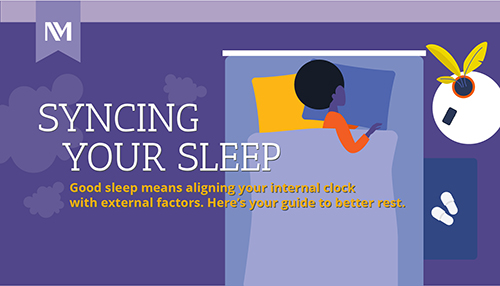
Sleep Health Centers
Northwestern Medicine Sleep Health Centers provide day and night sleep studies for diagnosis and treatment of sleep disorders, including sleep apnea, periodic limb movement disorder, nocturnal behaviors (sleep walking, talking and eating in sleep, acting out dreams) disorders and narcolepsy.
What are sleep disorders?
Sleep disorders may involve difficulty staying awake or having a regular sleep/wake cycle, sleepwalking, nightmares, bed-wetting, insomnia, restless leg syndrome and sleep apnea. They often cause trouble staying alert, irritability and difficulty concentrating or remembering facts.
The Centers for Disease Control (CDC) have called insufficient sleep a public health epidemic in the United States. If you’re frequently tired, wake frequently or fall asleep when you are trying to stay awake, you can complete the Epworth Sleepiness Scale to determine if you’re a candidate for a sleep study.
Millions of Americans suffer from a sleep disorder. Sleep problems can interfere with quality of life and personal health, and they have a negative impact on society. Consider the following facts about sleep disorders:
- A sleep disorder can aggravate or lead to serious health problems
- Studies show a high incidence of sleep apnea in people with heart disease
- Sleep apnea is known to raise blood pressure
- Persistent, untreated insomnia may lead to major depression, anxiety disorders and substance abuse
- Sleep deprivation and sleep disorders are costing Americans an estimated $100 billion+ annually in lost productivity, medical expenses, sick leave, property and environmental damage
- Nearly 7 out of 10 Americans experience frequent sleep problems, which means 40 million people have not been diagnosed
Meet the Teams

Conditions
- Bruxism (Teeth grinding)
- Circadian Rhythm Sleep Disorders
- Hypersomnia
- Insomnia
- Narcolepsy
- Parasomnias
- Periodic Limb Movements In Sleep (PLMS)
- Restless Legs Syndrome
- Sleep Apnea
- Somnambulism (Sleepwalking)
Treatments
- Cognitive Behavioral Therapy
- Continuous Positive Airway Pressure (CPAP)
- Lifestyle Modification Considerations for Epilepsy
- Sleep Hygiene
- Sleep Surgery
Tests
Sleep Testing and Evaluation
Additional evaluation and diagnostic testing for sleep disorders may include:
- Maintenance of wakefulness (MWT): This test examines your ability to stay awake and alert during a series of 40-minute sessions during the day.
- Bi-level airway pressure therapy: If you can’t tolerate normal CPAP pressures, this advanced therapy offers a modification in the inspiratory and expiratory pressures (breathing in and out) to allow for a more comfortable experience in maintaining a more open airway.
- Auto servo ventilation and average volume assured pressure support (AVAPS): This test is used if you experience hypoventilation, which is reduced air into the lungs, resulting in too little oxygen in the body. Some causes of hypoventilation are respiratory muscle weakness (such as ALS) or neuromuscular disorders (such as muscular dystrophy), restrictive disorders (such as scoliosis or obesity hypoventilation) and obstructive lung disease (such as COPD or cystic fibrosis).
- Oral appliance: Your dentist may refer you for pretesting to see if you qualify for an oral appliance. If testing determines that an oral appliance would be beneficial, your dentist will fit you with an appropriate appliance and you can return for a post treatment study to evaluate the effectiveness of the appliance.
Why Choose Northwestern Medicine
The Northwestern Medicine Sleep Health Centers can diagnose and treat numerous sleep disorders, including sleep apnea, periodic limb movement disorder, nocturnal behaviors (sleep walking, talking and eating in sleep, acting out dreams) disorders and narcolepsy.
If you are experiencing any of the following symptoms, you might be suffering from a sleep disorder:
- Heavy snoring followed by grunting
- Choking or gasping for breath during sleep
- Feeling tired or fatigued after sleeping
- Weight fluctuation and/or inability to lose weight
- Nodding off while driving
- Morning headaches
- Difficulty concentrating
- Irritability
- Memory loss
- Difficulty falling or staying asleep
- High blood pressure
- Diabetes
- Sexual dysfunction/impotence
- Frequent urination
- Depression or substance abuse
Our centers are staffed by neurology and pulmonary critical care physicians, board-certified or board-eligible sleep medicine specialists*, registered polysomnographic technologists, respiratory therapists specially trained in adult and pediatric sleep disorders that provide:
- Advanced diagnostic testing.
- Personalized attention from certified sleep specialists.
- Home-like amenities combined with modern technology put you at ease.
- Consistently high scores for overall patient satisfaction.
- Fast results shared with your primary care physician for follow-up and treatment.
Locations & Contact Information
Related Resources
The following resources are for patients receiving care at our sleep health centers. The information is provided by our clinical staff and patient education department.
- Better Sleep Newsletter, Fall 2021
- Sleep Journal: To obtain the most accurate sleep test results, keep a journal of your sleeping patterns and habits for at least two weeks prior to your sleep test. Bring the journal to your scheduled appointment.
- Sleep Questionnaire: Fill out this patient information form and bring it to your scheduled appointment.
In the spirit of keeping you well-informed, some of the physician(s) and/or individual(s) identified are neither agents nor employees of Northwestern Memorial HealthCare or any of its affiliate organizations. They have selected our facilities as places where they want to treat and care for their private patients.



